Related Research Articles
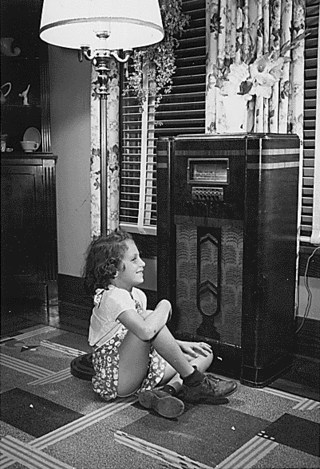
The Golden Age of Radio, also known as the old-time radio (OTR) era, was an era of radio in the United States where it was the dominant electronic home entertainment medium. It began with the birth of commercial radio broadcasting in the early 1920s and lasted through the 1950s, when television gradually superseded radio as the medium of choice for scripted programming, variety and dramatic shows.
A music video is a video that integrates a song or an album with imagery that is produced for promotional or musical artistic purposes. Modern music videos are primarily made and used as a music marketing device intended to promote the sale of music recordings. These videos are typically shown on music television and on streaming video sites like YouTube, or more rarely shown theatrically. They can be commercially issued on home video, either as video albums or video singles. The format has been described by various terms including "illustrated song", "filmed insert", "promotional (promo) film", "promotional clip", "promotional video", "song video", "song clip", "film clip", "video clip", or simply "video".

Stephen Valentine Patrick William Allen was an American television and radio personality, comedian, musician, composer, writer and actor. In 1954, he achieved national fame as the co-creator and first host of The Tonight Show, which was the first late-night television talk show.

Kinescope, shortened to kine, also known as telerecording in Britain, is a recording of a television programme on motion picture film, directly through a lens focused on the screen of a video monitor. The process was pioneered during the 1940s for the preservation, re-broadcasting and sale of television programmes before the introduction of quadruplex videotape, which from 1956 eventually superseded the use of kinescopes for all of these purposes. Kinescopes were the only practical way to preserve live television broadcasts prior to videotape.

Fabian Anthony Forte, professionally known as Fabian, is an American singer and actor.
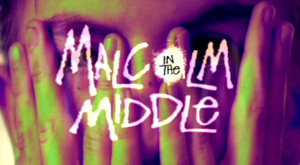
Malcolm in the Middle is an American sitcom created by Linwood Boomer for Fox. The series premiered on January 9, 2000, and ended on May 14, 2006, after seven seasons and 151 episodes.

John Peter Farnham AO is a British-born Australian singer. Farnham was a teen pop idol from 1967 until 1979, billed until then as Johnny Farnham. He has since forged a career as an adult contemporary singer. His career has mostly been as a solo artist, although he replaced Glenn Shorrock as lead singer of Little River Band from 1982 to 1985.
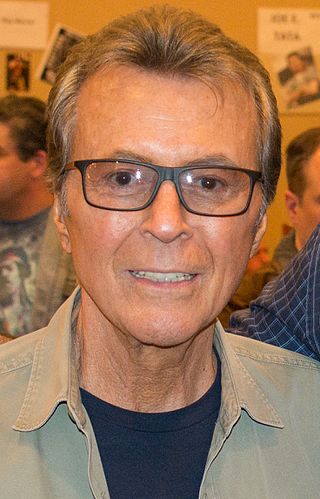
James William Ercolani known by his stage name James Darren, is an American television and film actor, television director, and singer. During the late 1950s and early 1960s, he had notable starring and supporting roles in films including Gidget (1959) and its sequels, The Gene Krupa Story (1959), All the Young Men (1960), The Guns of Navarone (1961), and Diamond Head (1962). As a teen pop singer, he achieved hit singles including "Goodbye Cruel World" in 1961. He later became more active in television, starring as Dr. Anthony Newman in the science fiction series The Time Tunnel (1966–1967). He appeared in the regular role of Officer III James Corrigan in the police drama T. J. Hooker (1983–1986) and in the recurring role of Vic Fontaine in Star Trek: Deep Space Nine (1998–1999).

Wonga Philip Harris was an American actor, comedian, singer and songwriter. He was an orchestra leader and a pioneer in radio situation comedy, first with The Jack Benny Program, then in The Phil Harris-Alice Faye Show in which he co-starred with his wife, singer-actress Alice Faye, for eight years. Harris is also noted for his voice acting in animated films. As a voice actor, he played Baloo in The Jungle Book (1967), Thomas O'Malley in The Aristocats (1970), Little John in Robin Hood (1973), and Patou in Rock-a-Doodle (1991). As a singer, he recorded a #1 novelty hit record, "The Thing" (1950).

The Adventures of Ozzie and Harriet is an American television sitcom that aired on ABC from October 3, 1952, to April 23, 1966, and starred the real-life Nelson family. After a long run on radio, the show was brought to television, where it continued its success, initially running simultaneously on radio and TV. In terms of seasons, it was the longest running live-action sitcom in U.S. television history until It's Always Sunny in Philadelphia surpassed it on December 1, 2021. The series starred the entertainment duo of Ozzie Nelson and his wife, singer Harriet Nelson, and their sons, David and Ricky. Don DeFore had a recurring role as the Nelsons' neighbor "Thorny".

Robert Louis Ridarelli, known by the stage name Bobby Rydell, was an American singer and actor who mainly performed rock and roll and traditional pop music. In the early 1960s he was considered a teen idol. His most well-known songs include "Wildwood Days", "Wild One" and "Volare" ; in 1963 he appeared in the musical film Bye Bye Birdie.

The Bootleg Series Vol. 7: No Direction Home: The Soundtrack is a compilation album by Bob Dylan. The fifth installment in the ongoing Bob Dylan Bootleg Series, it was released in 2005 in conjunction with the Martin Scorsese PBS television documentary on Dylan, No Direction Home, and was compiled with Scorsese's input. It features mostly previously unreleased material from Dylan's formative years to his rise as an international figure, from 1959 to his 1966 world tour.

Davenie Johanna "Joey" Heatherton is an American actress, dancer, and singer. A sex symbol of the 1960s and 1970s, she is best known for her many television appearances during that time, particularly as a frequent variety show performer, although she also appeared in acting roles. She performed for over a decade on USO tours presented by Bob Hope and starred in several feature films, including My Blood Runs Cold (1965) and The Happy Hooker Goes to Washington (1977).
Autumn Affair is an Australian television series made by and aired by Network Seven station ATN-7, and also shown in Melbourne on Nine Network station GTV-9. Television in Australia had only been broadcasting since 1956 and Seven was the first commercial station to make drama a priority. It premiered 24 October 1958 and continued until 1959. The series was the first ever Australian television soap opera. It was also the second regular Australian-produced dramatic television series of any kind, with previous locally produced drama consisting of religious series The House on the Corner, and one-off plays largely aired on ABC.
Homicide was an Australian television police procedural drama series made by production firm Crawford Productions for the Seven Network. It was the television successor to Crawfords' radio series D24. The "Consummate Homicide cast" includes the four characters that are the best known: Det. Snr. Sgt. David "Mac" MacKay, Det. Sgt. Peter Barnes, Inspector Colin Fox and Sen. Det. Jim Patterson.

Whiplash was a British/Australian television series in the Australian Western genre, produced by the Seven Network, ATV, and ITC Entertainment, and starring Peter Graves. Filmed in 1959-60, the series was first broadcast in the United Kingdom in September 1960, and in Australia in February 1961.
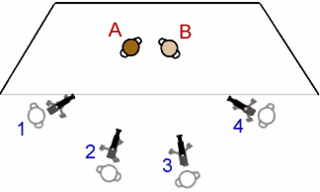
The multiple-camera setup, multiple-camera mode of production, multi-camera or simply multicam is a method of filmmaking and video production. Several cameras—either film or professional video cameras—are employed on the set and simultaneously record or broadcast a scene. It is often contrasted with a single-camera setup, which uses one camera.
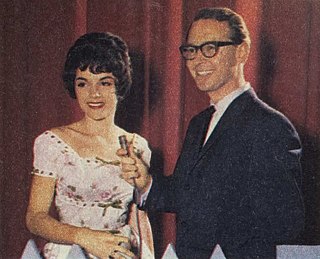
Bandstand is an Australian live pop music, variety television program screened from November 1958 to June 1972. Featuring both local and international music artists, and produced in-house at the studios of the Nine Network in Willoughby, New South Wales, it was originally broadcast only in New South Wales, It became a national program in the early 1960s as the network expanded into other Australian states. The host of Bandstand for its entire existence was radio presenter and television newsreader Brian Henderson.

Lost television broadcasts are mostly those early television programs which cannot be accounted for in studio archives usually because of deliberate destruction or neglect.
Make Ours Music was an Australian music television series which aired from 1958 to circa 1961 on ABC. Produced in Sydney, it also aired in Melbourne. Originally a half-hour series, it later expanded to an hour. Make Ours Music featured a mix of live songs and dance numbers.
References
- 1 2 3 Isackson, Leon; Hayton, Jon (21 July 2014). Behind the Rock and Beyond. eBookIt.com. ISBN 978-1-4566-0459-2.
- ↑ MacLean, Stephen (10 September 2015). "Chapter 6". Peter Allen: The Boy From Oz. Momentum. ISBN 978-1-76030-148-4.
- ↑ "[TEEN TIME : DOCUMENTATION]". National Film and Sound Archive . Retrieved 9 August 2023.